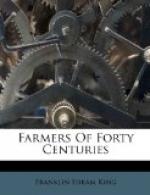This marvelous heritage of economy, industry and thrift, bred of the stress of centuries, must not be permitted to lose virility through contact with western wasteful practices, now exalted to seeming virtues through the dazzling brilliancy of mechanical achievements. More and more must labor be dignified in all homes alike, and economy, industry and thrift become inherited impulses compelling and satisfying.
Cheap, rapid, long distance transportation, already well started in these countries, will bring with it a fuller utilization of the large stores of coal and mineral wealth and of the enormous available water power, and as a result there will come some temporary lessening of the stress for fuel and with better forest management some relief along the lines of building materials. But the time is not a century distant when, throughout the world, a fuller, better development must take place along the lines of these most far-reaching and fundamental practices so long and so effectively followed by the Mongolian races in China, Korea and Japan. When the enormous water-power of these countries has been harnessed and brought into the foot-hills and down upon the margins of the valleys and plains in the form of electric current, let it, if possible, be in a large measure so distributed as to become available in the country village homes to lighten the burden and lessen the human drudgery and yet increase the efficiency of the human effort now so well bestowed upon subsidiary manufactures under the guidance and initiative of the home, where there may be room to breathe and for children to come up to manhood and womanhood in the best conditions possible, rather than in enormous congested factories.
VIII
TRAMPS AFIELD
On March 31st we took the 8 A. M. train on the Shanghai-Nanking railway for Kunshan, situated thirty-two miles west from Shanghai, to spend the day walking in the fields. The fare, second class, was eighty cents, Mexican. A third class ticket would have been forty cents and a first class, $1.60, practically two cents, one cent and half a cent, our currency, per mile. The second class fare to Nanking, a distance of 193 miles, was $1.72, U. S. currency, or a little less than one cent per mile. While the car seats were not upholstered, the service was good. Meals were served on the train in either foreign or Chinese style, and tea, coffee or hot water to drink. Hot, wet face cloths were regularly passed and many Chinese daily newspapers were sold on the train, a traveler often buying two.
In the vicinity of Kunshan a large area of farm land had been acquired by the French catholic mission at a purchase price of $40, Mexican, per mow, or at the rate of $103.20 per acre. This they rented to the Chinese.




